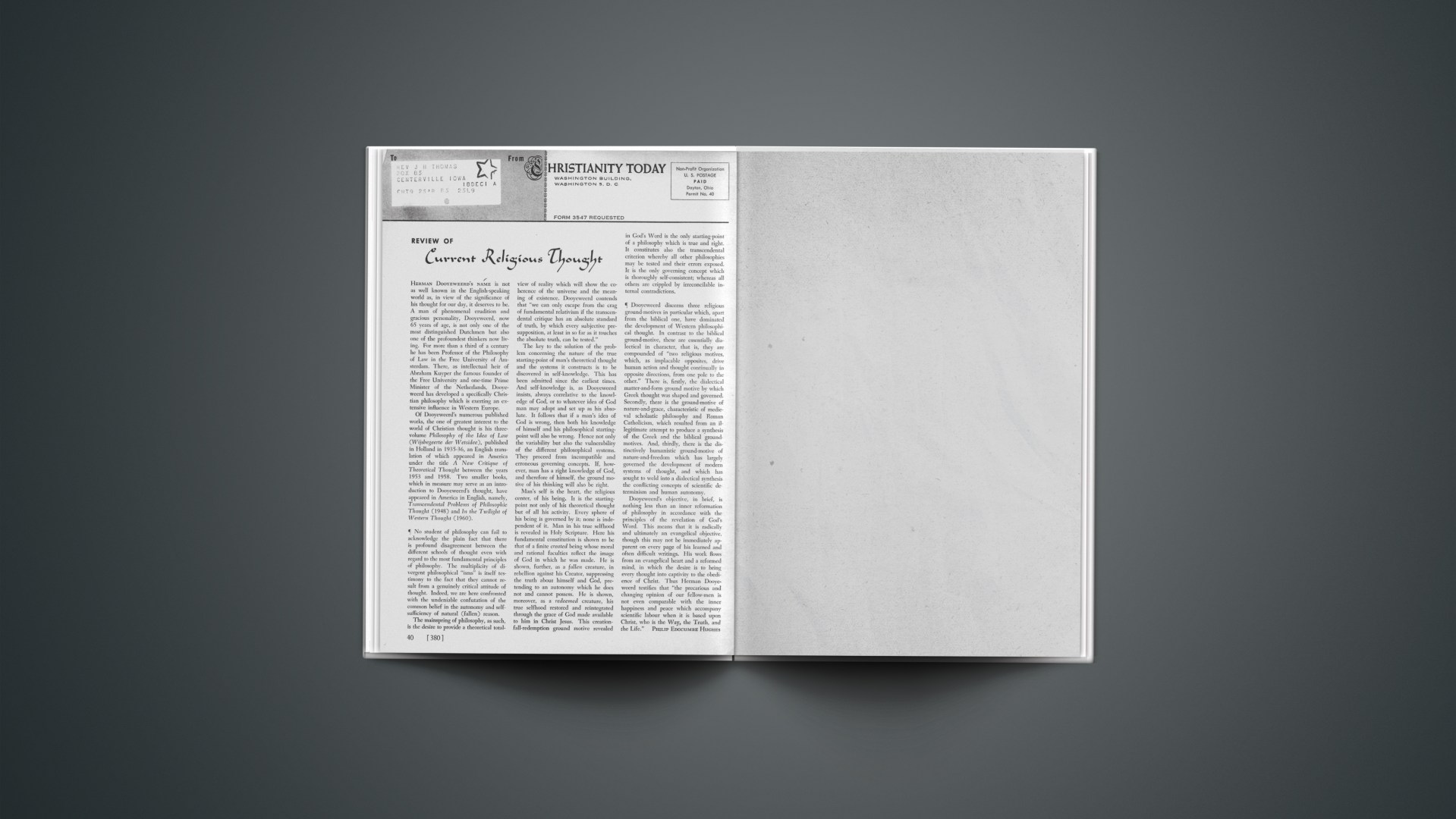Herman Dooyeweerd’s name is not as well known in the English-speaking world as, in view of the significance of his thought for our day, it deserves to be. A man of phenomenal erudition and gracious personality, Dooyeweerd, now 65 years of age, is not only one of the most distinguished Dutchmen but also one of the profoundest thinkers now living. For more than a third of a century he has been Professor of the Philosophy of Law in the Free University of Amsterdam. There, as intellectual heir of Abraham Kuyper the famous founder of the Free University and one-time Prime Minister of the Netherlands, Dooyeweerd has developed a specifically Christian philosophy which is exerting an extensive influence in Western Europe.
Of Dooyeweerd’s numerous published works, the one of greatest interest to the world of Christian thought is his three-volume Philosophy of the Idea of Law (Wijsbegeerte der Wetsidee), published in Holland in 1935–36, an English translation of which appeared in America under the title A New Critique of Theoretical Thought between the years 1953 and 1958. Two smaller books, which in measure may serve as an introduction to Dooyeweerd’s thought, have appeared in America in English, namely, Transcendental Problems of Philosophic Thought (1948) and In the Twilight of Western Thought (1960).
No student of philosophy can fail to acknowledge the plain fact that there is profound disagreement between the different schools of thought even with regard to the most fundamental principles of philosophy. The multiplicity of divergent philosophical “isms” is itself testimony to the fact that they cannot result from a genuinely critical attitude of thought. Indeed, we are here confronted with the undeniable confutation of the common belief in the autonomy and self-sufficiency of natural (fallen) reason.
The mainspring of philosophy, as such, is the desire to provide a theoretical total-view of reality which will show the coherence of the universe and the meaning of existence. Dooyeweerd contends that “we can only escape from the crag of fundamental relativism if the transcendental critique has an absolute standard of truth, by which every subjective presupposition, at least in so far as it touches the absolute truth, can be tested.”
The key to the solution of the problem concerning the nature of the true starting-point of man’s theoretical thought and the systems it constructs is to be discovered in self-knowledge. This has been admitted since the earliest times. And self-knowledge is, as Dooyeweerd insists, always correlative to the knowledge of God, or to whatever idea of God man may adopt and set up as his absolute. It follows that if a man’s idea of God is wrong, then both his knowledge of himself and his philosophical starting-point will also be wrong. Hence not only the variability but also the vulnerability of the different philosophical systems. They proceed from incompatible and erroneous governing concepts. If, however, man has a right knowledge of God, and therefore of himself, the ground motive of his thinking will also be right.
Man’s self is the heart, the religious center, of his being. It is the starting-point not only of his theoretical thought but of all his activity. Every sphere of his being is governed by it; none is independent of it. Man in his true selfhood is revealed in Holy Scripture. Here his fundamental constitution is shown to be that of a finite created being whose moral and rational faculties reflect the image of God in which he was made. He is shown, further, as a fallen creature, in rebellion against his Creator, suppressing the truth about himself and God, pretending to an autonomy which he does not and cannot possess. He is shown, moreover, as a redeemed creature, his true selfhood restored and reintegrated through the grace of God made available to him in Christ Jesus. This creation-fall-redemption ground motive revealed in God’s Word is the only starting-point of a philosophy which is true and right. It constitutes also the transcendental criterion whereby all other philosophies may be tested and their errors exposed. It is the only governing concept which is thoroughly self-consistent; whereas all others are crippled by irreconcilable internal contradictions.
Dooyeweerd discerns three religious ground-motives in particular which, apart from the biblical one, have dominated the development of Western philosophical thought. In contrast to the biblical ground-motive, these are essentially dialectical in character, that is, they are compounded of “two religious motives, which, as implacable opposites, drive human action and thought continually in opposite directions, from one pole to the other.” There is, firstly, the dialectical matter-and-form ground motive by which Greek thought was shaped and governed. Secondly, there is the ground-motive of nature-and-grace, characteristic of medieval scholastic philosophy and Roman Catholicism, which resulted from an illegitimate attempt to produce a synthesis of the Greek and the biblical ground-motives. And, thirdly, there is the distinctively humanistic ground-motive of nature-and-freedom which has largely governed the development of modern systems of thought, and which has sought to weld into a dialectical synthesis the conflicting concepts of scientific determinism and human autonomy.
Dooyeweerd’s objective, in brief, is nothing less than an inner reformation of philosophy in accordance with the principles of the revelation of God’s Word. This means that it is radically and ultimately an evangelical objective, though this may not be immediately apparent on every page of his learned and often difficult writings. His work flows from an evangelical heart and a reformed mind, in which the desire is to bring every thought into captivity to the obedience of Christ. Thus Herman Dooyeweerd testifies that “the precarious and changing opinion of our fellow-men is not even comparable with the inner happiness and peace which accompany scientific labour when it is based upon Christ, who is the Way, the Truth, and the Life.”










